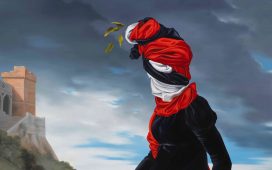Subtlety and reticence are the keynotes of this diverting if insistently downbeat new picture from Kelly Reichardt, photographed in the soft, indie-stonewashed colours that are part of this director’s signature. An artist and ceramicist in Portland, Oregon is on the verge of an important new show, but she’s plagued with personal problems. Her neighbour-slash-landlady (a fellow or rival artist, as it happens) is failing to fix the hot water in her apartment. Her cat has almost killed a pigeon in their street and she feels obliged to look after the poor injured thing in a cardboard box, instead of working. Her mother (an administrator in the community arts centre where the artist works) is querulously estranged from her dad, who appears to have freeloading house guests from Canada. And her bipolar brother, who also has artistic leanings, is digging a huge hole in his back garden.
For anyone else, these would be the ingredients for a screwball comedy, or a sexy art-world satire, or a very lively family drama. And that art world, even if it wasn’t being anatomised in the manner of, say, Ruben Östlund’s The Square, would be supercharged with importance – and that show itself would be a climactic set piece of excitement. Not in this film. The pace is even and sometimes almost torpid; the dialogue mostly murmuringly subdued. That excellent actor Michelle Williams plays the artist Lizzie (whose work is created especially for the film by ceramicist Cynthia Lahti) and she looks tired and depressed all the time, with dark circles under her eyes. Partly, of course, her depression is due to not being able to have a shower: a very rare outburst of emotion comes when she leaves a furious message on the voicemail of her landlady Jo (Hong Chau) about the hot water; by contrast, she is restrained when Eric (André Benjamin, aka Outkast’s André 3000), an artist and assistant at the arts centre, accidentally leaves one of her models in the kiln too long.
Of course, her anxiety is also due to the imminent show, which is (presumably) very important to her career, but Lizzie isn’t hyperactive, or nervous, or on the phone to agents or friends. She moreover has no partner or significant other to whom she can vent – and this subject is never discussed. She just looks sad and stressed. But perhaps that is part of the film’s rationale, cleverly hinted at in the title: 90% of life is showing up, said Woody Allen, and that goes for the life of artistic creation. It’s the admin; it’s the shopping; it’s the dealing with family issues while making art at the same time. And sometimes it is in that context, the context of quotidian life itself, that the beauty of art and the artistic vocation flowers as a quiet miracle – and the pigeon itself is pressed into metaphorical service in that regard.
Of course, this film has the same problem as any film about artists that isn’t openly ironic: if we see the fictional art by the fictional artist, are we quite seriously supposed to think it’s good – as well as thinking that the film is good? Well, that too is complex and Reichardt pays her audience the compliment of expecting them to understand complexity. Lizzie is supposed to be talented, undoubtedly, but no one critiques her work in the course of the film. Hints about the nature of its quality are dropped. Lizzie is not shown as being a genius or staggeringly successful – but we, the movie audience, can make of her work what we will, just as we would with a real artist.
Everything in Showing Up is certainly valid, but I confess I thought it lacked some perspective on Lizzie’s life, and it is sometimes a bit studied and passionless, especially compared with Reichardt’s previous film, First Cow. But there is sympathy and charm and food for thought.








